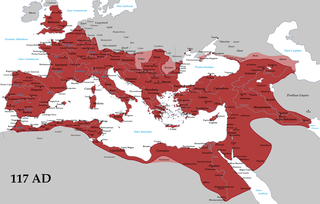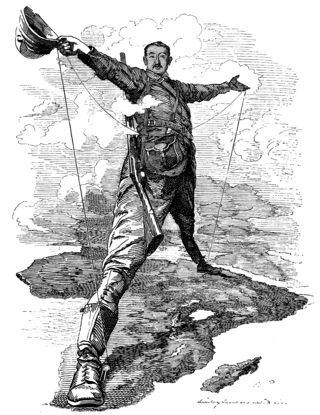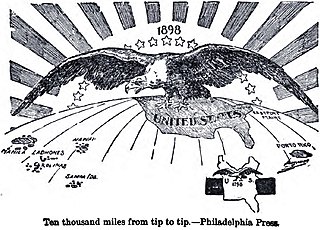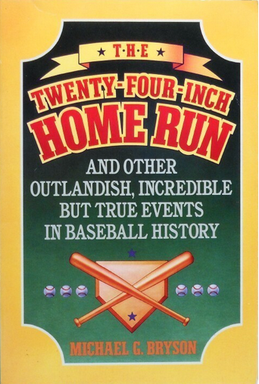
Cultural imperialism comprises the cultural dimensions of imperialism. The word "imperialism" describes practices in which a country engages culture to create and maintain unequal social and economic relationships among social groups. Cultural imperialism often uses wealth, media power and violence to implement the system of cultural hegemony that legitimizes imperialism.

An empire is a political unit made up of several territories, military outposts, and peoples, "usually created by conquest, and divided between a dominant center and subordinate peripheries". The center of the empire has political control over the peripheries. Within an empire, different populations have different sets of rights and are governed differently. Narrowly defined, an empire is a sovereign state whose head of state is an emperor or empress; but not all states with aggregate territory under the rule of supreme authorities are called empires or are ruled by an emperor; nor have all self-described empires been accepted as such by contemporaries and historians.

Imperialism is the maintaining and extending of power over foreign nations, particularly through expansionism, employing both hard power and soft power. Imperialism focuses on establishing or maintaining hegemony and a more or less formal empire. While related to the concept of colonialism, imperialism is a distinct concept that can apply to other forms of expansion and many forms of government.

Hegemony is the political, economic, and military predominance of one state over other states, either regional or global.

In historical contexts, New Imperialism characterizes a period of colonial expansion by European powers, the United States, and Japan during the late 19th and early 20th centuries. The period featured an unprecedented pursuit of overseas territorial acquisitions. At the time, states focused on building their empires with new technological advances and developments, expanding their territory through conquest, and exploiting the resources of the subjugated countries. During the era of New Imperialism, the European powers individually conquered almost all of Africa and parts of Asia. The new wave of imperialism reflected ongoing rivalries among the great powers, the economic desire for new resources and markets, and a "civilizing mission" ethos. Many of the colonies established during this era gained independence during the era of decolonization that followed World War II.
Media imperialism is an area in the international political economy of communications research tradition that focuses on how "all Empires, in territorial or nonterritorial forms, rely upon communications technologies and mass media industries to expand and shore up their economic, geopolitical, and cultural influence." In the main, most media imperialism research examines how the unequal relations of economic, military and cultural power between an imperialist country and those on the receiving end of its influence tend to be expressed and perpetuated by mass media and cultural industries.

American imperialism is the expansion of American political, economic, cultural, media, and military influence beyond the boundaries of the United States of America. Depending on the commentator, it may include imperialism through outright military conquest; military protection; gunboat diplomacy; unequal treaties; subsidization of preferred factions; regime change; economic or diplomatic support; or economic penetration through private companies, potentially followed by diplomatic or forceful intervention when those interests are threatened.

The term "Soviet empire" collectively refers to the world's territories that the Soviet Union dominated politically, economically, and militarily. This phenomenon, particularly in the context of the Cold War, is also called Soviet imperialism by Sovietologists to describe the extent of the Soviet Union's hegemony over the Second World.
Linguistic imperialism or language imperialism is occasionally defined as "the transfer of a dominant language to other people". This language "transfer" comes about because of imperialism. The transfer is considered to be a sign of power; traditionally military power but also, in the modern world, economic power. Aspects of the dominant culture are usually transferred along with the language. In spatial terms, a few of Europe's hundreds of indigenous languages are employed in the function of official (state) languages in Eurasia, while only non-indigenous imperial (European) languages in the "Rest of the World". In the modern world, linguistic imperialism may also be considered in the context of international development, affecting the standard by which organizations like the International Monetary Fund and the World Bank evaluate the trustworthiness and value of structural adjustment loans by virtue of views that are commonly foregrounded in English-language discourse and not neutral.

Wesley Branch Rickey was an American baseball player and sports executive. Rickey was instrumental in breaking Major League Baseball's color barrier by signing black player Jackie Robinson. He also created the framework for the modern minor league farm system, encouraged the major leagues to add new teams through his involvement in the proposed Continental League, and introduced the batting helmet. He was posthumously elected to the Baseball Hall of Fame in 1967.
The color line, also known as the color barrier, in American baseball excluded players of black African descent from Major League Baseball and its affiliated Minor Leagues until 1947. Racial segregation in professional baseball was sometimes called a gentlemen's agreement, meaning a tacit understanding, as there was no written policy at the highest level of organized baseball, the major leagues. A high minor league's vote in 1887 against allowing new contracts with black players within its league sent a powerful signal that eventually led to the disappearance of blacks from the sport's other minor leagues later that century, including the low minors. After the line was in virtually full effect in the early 20th century, many black baseball clubs were established, especially during the 1920s to 1940s when there were several Negro leagues. During this period, American Indians and native Hawaiians, including Prince Oana, were able to play in the Major Leagues. The color line was broken for good when Jackie Robinson signed with the Brooklyn Dodgers organization for the 1946 season. In 1947, both Robinson in the National League and Larry Doby with the American League's Cleveland Indians appeared in games for their teams.

Robert David Kaplan is an American author. His books are on politics, primarily foreign affairs, and travel. His work over three decades has appeared in The Atlantic, The Washington Post, The New York Times, The New Republic, The National Interest, Foreign Affairs and The Wall Street Journal, among other publications.

The historiography of the British Empire refers to the studies, sources, critical methods and interpretations used by scholars to develop a history of the British Empire. Historians and their ideas are the main focus here; specific lands and historical dates and episodes are covered in the article on the British Empire. Scholars have long studied the Empire, looking at the causes for its formation, its relations to the French and other empires, and the kinds of people who became imperialists or anti-imperialists, together with their mindsets. The history of the breakdown of the Empire has attracted scholars of the histories of the United States, the British Raj, and the African colonies. John Darwin (2013) identifies four imperial goals: colonising, civilising, converting, and commerce.

Albert Hamilton Williams DeSouza is a Nicaraguan former professional baseball pitcher. He played all or part of five seasons in Major League Baseball, from 1980 until 1984, all for the Minnesota Twins.
The American Empire Project is a book series that deals with imperialist and exceptionalist tendencies in US foreign policy in the early 21st century. The series is published by Metropolitan Books and includes contributions by such notable American thinkers and authors as Noam Chomsky, Howard Zinn, Chalmers Johnson and Andrew Bacevich. The project's goal is to critique what the authors consider the imperial ambitions of the United States and to explore viable alternatives for foreign policy.
The term informal empire describes the spheres of influence which a polity may develop that translate into a degree of influence over a region or country, which is not a formal colony, protectorate, tributary or vassal state of empire, as a result of its commercial, strategic or military interests.

A People's History of American Empire is a 2008 graphic history by Howard Zinn, Mike Konopacki, and Paul Buhle. The book combines material from Zinn's history book A People's History of the United States and his autobiography You Can't Be Neutral on a Moving Train with new material from other sources, most notably George Lipsitz's A Rainbow at Midnight: Labor and Culture in the 1940s and Jim Zwick's Mark Twain's Weapons of Satire: Anti-Imperialist Writings on the Philippine-American War. Various historic subjects are covered as well as Zinn's own history of involvement in activism and historic events. The book was the last of Zinn's books that was published within his lifetime.

The Twenty-Four-Inch Home Run: And Other Outlandish, Incredible But True Events in Baseball History is a book about baseball lore written by sportswriter Michael G. Bryson. The title refers to the book's central story, about a game where Andy Oyler hit a baseball that became stuck in the mud 24 inches in front of home plate, allowing him to score an inside-the-park home run before the opposing team located it. All told, the book contains 250 such stories, including an anecdote about a team registering a triple play without touching the ball. Bryson also debunks several well-known baseball legends, including Babe Ruth's called shot and the story that Abner Doubleday invented baseball.

Anti-imperialism in political science and international relations is opposition to imperialism or neocolonialism. Anti-imperialist sentiment typically manifests as a political principle in independence struggles against intervention or influence from a global superpower, as well as in opposition to colonial rule. Anti-imperialism can also arise from a specific economic theory, such as in the Leninist interpretation of imperialism, which is derived from Lenin's 1917 work Imperialism, the Highest Stage of Capitalism. People who categorize themselves as anti-imperialists often state that they are opposed to colonialism, colonial empires, hegemony, imperialism and the territorial expansion of a country beyond its established borders.

Russian imperialism is the political, economic and cultural influence, as well as military power, exerted by Russia and its predecessor states, over other countries and territories. It includes the conquests of the Tsardom of Russia, the Russian Empire, the imperialism of the Soviet Union, and the neo-imperialism of the Russian Federation. Some postcolonial scholars have noted the lack of attention given to Russian and Soviet imperialism in the discipline.














